Join Our Newsletter To Be Informed When New Videos Are Posted
Join the thousands of fellow Studends who rely on our videos to learn how to read the bible in Hebrew for free!
Hebrew Text
רַק אֶל־אֶרֶץ בְּנֵי־עַמּוֹן לֹא קָרָבְתָּ כָּל־יַד נַחַל יַבֹּק וְעָרֵי הָהָר וְכֹל אֲשֶׁר־צִוָּה יְהוָה אֱלֹהֵינוּ׃
English Translation
only to the land of the children of ῾Ammon thou didst not come, nor to any place of the torrent of Yabboq, nor to the cities in the mountains, nor to whatever place the Lord our God forbad us.
Transliteration
Rak el-eretz bnei-ammon lo karavta kol-yad nachal yabok ve'arei hahar vechol asher-tziva Adonai Eloheinu.
Hebrew Leining Text
רַ֛ק אֶל־אֶ֥רֶץ בְּנֵי־עַמּ֖וֹן לֹ֣א קָרָ֑בְתָּ כׇּל־יַ֞ד נַ֤חַל יַבֹּק֙ וְעָרֵ֣י הָהָ֔ר וְכֹ֥ל אֲשֶׁר־צִוָּ֖ה יְהֹוָ֥ה אֱלֹהֵֽינוּ׃
רַ֛ק אֶל־אֶ֥רֶץ בְּנֵי־עַמּ֖וֹן לֹ֣א קָרָ֑בְתָּ כׇּל־יַ֞ד נַ֤חַל יַבֹּק֙ וְעָרֵ֣י הָהָ֔ר וְכֹ֥ל אֲשֶׁר־צִוָּ֖ה יְהֹוָ֥ה אֱלֹהֵֽינוּ׃
🎵 Listen to leining
Parasha Commentary
📚 Talmud Citations
This verse is not quoted in the Talmud.


Context in Devarim (Deuteronomy)
The verse appears in Devarim 2:37, where Moshe recounts Bnei Yisrael's journey and the lands they were commanded not to conquer. This reflects Hashem's specific boundaries for their conquest, emphasizing that they were to take only what was divinely allotted to them.
Rashi's Explanation
Rashi (Devarim 2:37) clarifies that the prohibition against conquering Ammonite territory stems from Hashem's earlier promise to Avraham (Bereishit 19:37-38), as Ammon was descended from Lot. Since Lot was Avraham's nephew, his descendants' land was protected by this ancestral merit. Rashi further notes that the "torrent of Yabboq" (נחל יבק) marked the border, reinforcing the geographical limits set by Hashem.
Rambam's Perspective
In Hilchot Melachim (Laws of Kings 5:1), Rambam discusses the halachic principle that Bnei Yisrael were forbidden to wage war against Ammon and Moav unless provoked. This prohibition, rooted in this verse, teaches the importance of adhering to divine commandments even in military conquests—showing restraint where Hashem dictates.
Midrashic Insights
Halachic Implications
The verse underscores the eternal prohibition (later codified in Choshen Mishpat) against seizing land unlawfully. The Chatam Sofer (Responsa 6:29) derives from here that territorial disputes must align with Torah law, not mere human desire.